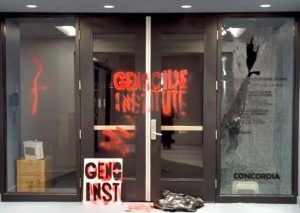Members of Toronto’s Muslim community formed “rings of peace” around seven Toronto-area shuls last Shabbat, in a show of solidarity with the local Jewish community, in the wake of the shooting at the Tree of Life synagogue in Pittsburgh on Oct. 27. The gesture echoes the rings of peace formed around mosques in February 2017, following the shooting in Quebec City.
The rings of peace, which are created by people holding hands in a circle around a place of worship, were formed around Holy Blossom Temple, Beth Tzedec Congregation, Solel, Temple Har Zion, City Shul, Beth Shalom and Temple Sinai.
The idea was first brought to Toronto last year by Rabbi Yael Splansky of Holy Blossom Temple, who remembered seeing a photograph of Muslim people forming a ring of peace around a synagogue in Oslo that had been threatened. She contacted other Jewish leaders and suggested doing the same in Toronto.
Seven rings of peace were eventually formed by Jewish people and others who wanted to show their solidarity with the Muslim community. Rabbi Splansky was later asked to address the congregation at the Imdadul Islamic Centre. She was the first woman and the first Jew to be invited into the sanctuary where the men pray.
“I told them they were right to come to Canada and to know they would be protected and would have freedom of religion here,” said Rabbi Splansky. “That was a very meaningful day. We never forgot it and they never forgot it.”
READ: BURAKOWSKI: WHAT A WONDERFUL WORLD
When Osman Khan, general secretary of the Imdadul Islamic Centre, heard about the attack in Pittsburgh, he remembered the gesture from the Jewish community and what it meant to his community. So he and other Islamic leaders in the Greater Toronto Area helped organize the rings of peace around synagogues.
“We are people of faith. We came from one lineage. We have to answer our creator on our actions to our fellow human beings. We may have different beliefs, but we are brothers and sisters unto each other,” said Khan. “The senseless killing at the Tree of Life synagogue resonated with every human being.”
Beforehand, Khan said that extra focus would be paid to Holy Blossom, because one of the women killed in Pittsburgh, Joyce Fienberg, was married there and many of her cousins are still members.
Khan was invited to speak inside Holy Blossom during its Shabbat services, and the significance of speaking at Toronto’s oldest Jewish congregation was not lost on him (Holy Blossom was founded in 1856).
“Can you imagine what an honour it was to be invited there and to be given an opportunity to address the congregation?” said Khan, standing in front of Holy Blossom with tears in his eyes as the Muslim leaders led a song of peace behind him. “It was overwhelming. It was emotional for me.”
As the rabbi of a congregation that was especially affected by the massacre, Rabbi Splansky welcomed the show of solidarity from the Muslim community and everyone else who joined them.
“It reinforces what we know is true: that most people are good and most people are kind and most people are empathetic and compassionate and are willing to give of their precious time to express what is good and just. We know that’s true,” she said. “I was very proud of the community. People really did show up again and again and again.”
Rabbi Splansky also stressed that it’s important to look for the light in even the darkest of situations, like the celebration for the cantor’s granddaughter, who had her bat mitzvah this past Shabbat.
“It wasn’t only sombre, it was also very joyful,” said Rabbi Splansky. “Shabbat certainly did her magic in uplifting us. That’s an important part of Jewish life, making sure that we don’t only mourn together, but that we celebrate together.”
For more in our #SolidarityShabbat series, please click here.






